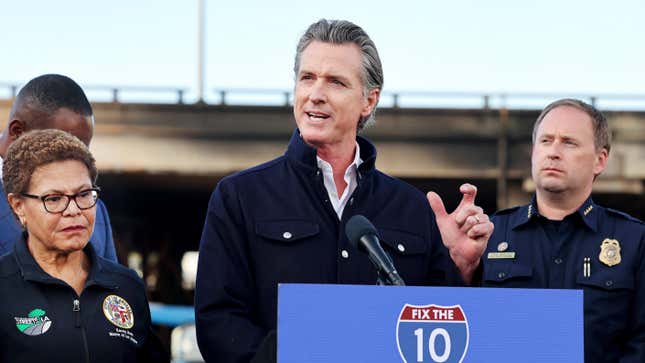
California Governor Gavin Newsom vetoed SB-961 on Saturday. If the bill had been signed into law, it would have required every vehicle built, sold, or leased in the state to be equipped with a passive intelligent speed assistance system by the 2030 model year. The bill defined such systems as a warning if a driver exceeded the posted speed limit by 10 miles per hour, not actively slowing the car against the driver’s will.
SB-961 seemed like a surefire measure to reduce the number of people killed in car crashes. Crashes where speeding was a significant factor killed 12,151 people in 2022, 28.6 percent of all traffic fatalities, according to NHTSA. Similar warning systems have been mandated for new cars across Europe since July. The continent-wide regulation meant cars from Portugal to Poland would be fitted with intelligent speed assistance, something that the California bill would not have directly done in the United States. Newsome stated in his veto message:
While I appreciate the intent to improve traffic safety, this bill presents several challenges. Federal law, as implemented by the National Highway Traffic Safety Administration (NHTSA), already regulates vehicle safety standards, and adding California-specific requirements would create a patchwork of regulations that undermines this longstanding federal framework. NHTSA is also actively evaluating intelligent speed assistance systems, and imposing state-level mandates at this time risks disrupting these ongoing federal assessments.
For these reasons, I cannot sign this bill.
While Newsom says he didn’t want to undermine the federal government, which California has done for decades through vehicle emissions regulations. His line of reasoning seems like an easy excuse to avoid the potential political blowback from people who don’t understand what ISA systems can and can’t do.
A SEMA-commissioned survey found that 51 percent of likely 2024 voters strongly oppose speed-limiting devices, with only 12 percent of voters in strong support. SEMA President and CEO Mike Spagnola said, “It is clear that Californians want to control their cars, not vice versa. That’s why we urge California legislators to listen to the voters they represent and shelve this unpopular bill.”
Again, the intelligent speed assistance systems mandated in the SB-961 can’t control a car. They use audio and visual warnings to alert drivers going 10 or more mph over the posted speed limit. If that’s draconian government control, we’ve been living in a dictatorship since seatbelt alarms were mandated in cars.


